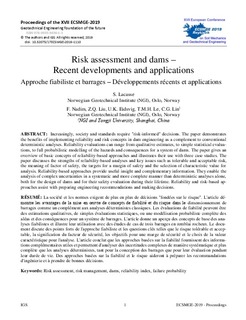Risk assessment and dams – Recent developments and applications
Chapter
Published version
Permanent lenke
http://hdl.handle.net/11250/2633884Utgivelsesdato
2019Metadata
Vis full innførselSamlinger
- NGI articles [1061]
Originalversjon
In Proceedings of the XVII ECSMGE-2019. Geotechnical Engineering foundation of the futureSammendrag
Increasingly, society and standards require "risk-informed" decisions. The paper demonstrates the benefits of implementing reliability and risk concepts in dam engineering as a complement to conventional deterministic analyses. Reliability evaluations can range from qualitative estimates, to simple statistical evaluations, to full probabilistic modelling of the hazards and consequences for a system of dams. The paper gives an overview of basic concepts of reliability-based approaches and illustrates their use with three case studies. The paper discusses the strengths of reliability-based analyses and key issues such as tolerable and acceptable risk, the meaning of factor of safety, the targets for a margin of safety and the selection of characteristic value for analysis. Reliability-based approaches provide useful insight and complementary information. They enable the analysis of complex uncertainties in a systematic and more complete manner than deterministic analyses alone, both for the design of dams and for their safety evaluation during their lifetime. Reliability and risk-based approaches assist with preparing engineering recommendations and making decisions.
